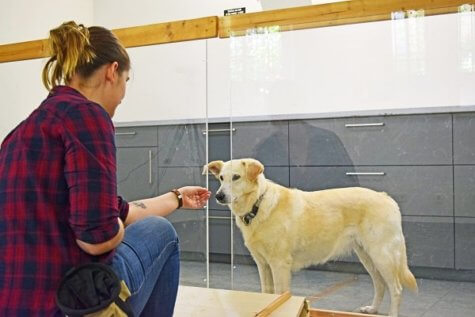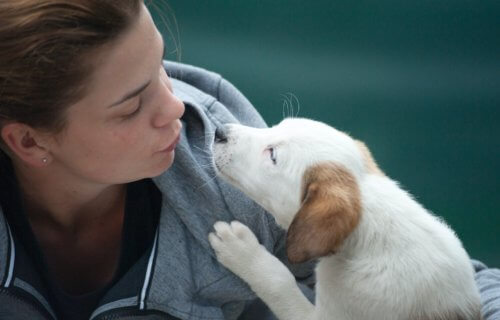GÖTTINGEN, Germany — Dog owners often brag about how smart their four-legged friends are. Now, a new study reveals that dogs may be even smarter than anyone gives them credit for. Although scientists have long suspected that being able to tell whether a person does something by accident or on purpose is a purely human skill, researchers in Germany find dogs can actually make the distinction as well.
Judging someone’s intentions — or at least being aware of them — is a basic concept of what scientists call Theory of Mind. The ability to correctly determine your own or someone else’s mental state is a trait many experts believed was unique to people. However, through as experiment using treats for dogs, researchers find that dogs behave differently depending on the intentional or unintentional actions of their handlers.
Testing the ‘unable vs. unwilling’ paradigm

(© Josepha Erlacher)
The team tested the abilities of 51 dogs under three distinct conditions. The different scenarios allowed researchers to examine how canines react to humans who either intentionally (the unwilling condition) or unintentionally (the unable condition) withheld a treat from them. Scientists call this the unable vs. unwilling paradigm, which has never been examined among dogs.
In each experiment, a transparent barrier separated the dogs and the human testers holding each pup’s treat. In the “unwilling” condition, the experimenter pulled the reward back through a gap in the barrier and placed it in front of themselves. For the “unable” conditions, researchers unintentionally kept the treats from dogs in two different ways. In the “unable-clumsy” experiment, trainers dropped the treats while trying to give them to the dogs. In the “unable-blocked,” humans tried to pass the treats to dogs, but “couldn’t” get it through the gap in the barrier.
“If dogs are indeed able to ascribe intention-in-action to humans,” says Dr. Juliane Bräuer from the Max Planck Institute for the Science of Human History in a university release. “We would expect them to show different reactions in the unwilling condition compared to the two unable conditions. As it turns out, this is exactly what we observed.”
I see what you did there, human
Study authors measured the time dogs waited before approaching the reward they did not receive. The team predicted that, if dogs really can judge a human’s intentions, they would wait longer before going after the treats in the unwilling condition — where humans intentionally withheld the food because they didn’t want the dogs to have them.
By the same logic, researchers predicted that dogs would go right after a treat that was unintentionally dropped or blocked because they would know humans want them to have a snack. Results show this is exactly what happened.
Not only did dogs wait longer in the unwilling condition, they were also more likely to sit or lie down to show they wanted to appease their handlers. They also stopped wagging their tails when humans intentionally withheld a treat.
“The dogs in our study clearly behaved differently depending on whether the actions of a human experimenter were intentional or unintentional,” says Britta Schünemann, first author of the study.
“This suggests that dogs may indeed be able to identify humans’ intention-in-action,” adds Hannes Rakoczy from the University of Göttingen.
Researchers admit some scientists may greet their findings with skepticism and add that they need to perform more behavioral tests to confirm the results.
“Nevertheless, the findings present important initial evidence that dogs may have at least one aspect of Theory of Mind: The capacity to recognize intention-in-action,” researchers conclude.
The findings appear in the journal Scientific Reports.
